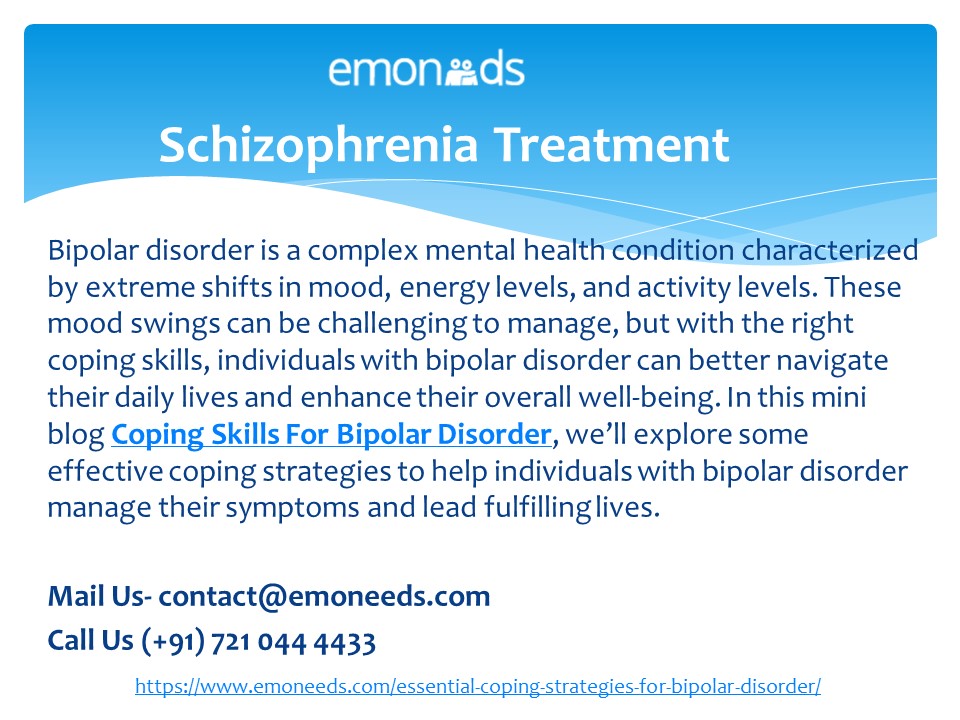Coping Strategies for Bipolar Disorder - PowerPoint PPT Presentation
Title:
Coping Strategies for Bipolar Disorder
Description:
These tactics cover a wide range of topics, including self-care, relationships, mental health management, and personal development. Individuals with bipolar disorder can improve their ability to manage symptoms, recover control of their lives, and embrace a path of resilience and well-being by implementing these coping methods into their daily routine. – PowerPoint PPT presentation
Number of Views:1
Title: Coping Strategies for Bipolar Disorder
1
Schizophrenia Treatment
- Bipolar disorder is a complex mental health
condition characterized by extreme shifts in
mood, energy levels, and activity levels. These
mood swings can be challenging to manage, but
with the right coping skills, individuals with
bipolar disorder can better navigate their daily
lives and enhance their overall well-being. In
this mini blog Coping Skills For Bipolar
Disorder, well explore some effective coping
strategies to help individuals with bipolar
disorder manage their symptoms and lead
fulfilling lives. - Mail Us- contact_at_emoneeds.com
- Call Us (91) 721 044 4433
https//www.emoneeds.com/essential-coping-strategi
es-for-bipolar-disorder/
2
Coping Strategies for Bipolar Disorder
In this mini blog Coping Skills For Bipolar
Disorder, well explore some effective coping
strategies to help individuals with bipolar
disorder manage their symptoms and lead
fulfilling lives.
- Medication Adherence Consistently taking
prescribed medications is crucial for managing
bipolar disorder. Medications help stabilize mood
swings and prevent severe episodes. Always follow
your doctors recommendations and maintain open
communication about any side effects or concerns. - Therapy and Counseling Therapeutic interventions
like cognitive-behavioral therapy (CBT) and
dialectical behavior therapy (DBT) can equip
individuals with skills to recognize and manage
mood shifts, improve interpersonal relationships,
and develop effective coping mechanisms.
3
- Regular Sleep Patterns Maintaining a regular
sleep schedule can greatly impact mood stability.
Both manic and depressive episodes can be
triggered by disruptions in sleep patterns.
Prioritize a consistent sleep routine to help
regulate mood and energy levels. - Healthy Lifestyle Choices Engaging in regular
exercise, eating a balanced diet, and avoiding
excessive alcohol or substance use can positively
influence mood stability. Exercise releases
endorphins, which can alleviate depressive
symptoms, while a balanced diet supports overall
brain health.
4
Stress Reduction Techniques Practice
stress-reduction techniques like mindfulness
meditation, deep breathing exercises, and
progressive muscle relaxation. These techniques
can help individuals manage anxiety and prevent
potential mood swings. Support Network Maintain
a strong support network of friends, family
members, or support groups who understand your
condition. Open communication and having a
reliable support system can help alleviate
feelings of isolation.
5
Journaling Keeping a mood journal can help track
patterns and triggers in mood shifts. This
information can be invaluable for healthcare
providers in adjusting treatment plans and
identifying potential warning signs. Structured
Routine Create a structured daily routine that
includes set times for meals, exercise, work, and
relaxation. Predictability can provide stability
and reduce the risk of sudden mood
shifts. Mindful Approach to Goals While setting
goals is important, its essential to be
realistic and considerate of your current mood
state. Break down larger goals into smaller,
manageable steps to prevent feeling overwhelmed.
6
Schizophrenia Treatment Counselling Emoneeds
Get online Online Bipolar Counselling help from
expert psychiatrists and psychologists at
Emoneeds. Our compassionate care and
evidence-based treatments can help you manage
symptoms of schizophrenia. Learn more on our
schizophrenia. Mail Us- contact_at_emoneeds.com Call
Us (91) 721 044 4433
7
About Us
Call Us (91) 721 044 4433
Add. Q 50, South City I, Sector 40, South City I,
Gurugram, Haryana 122001

